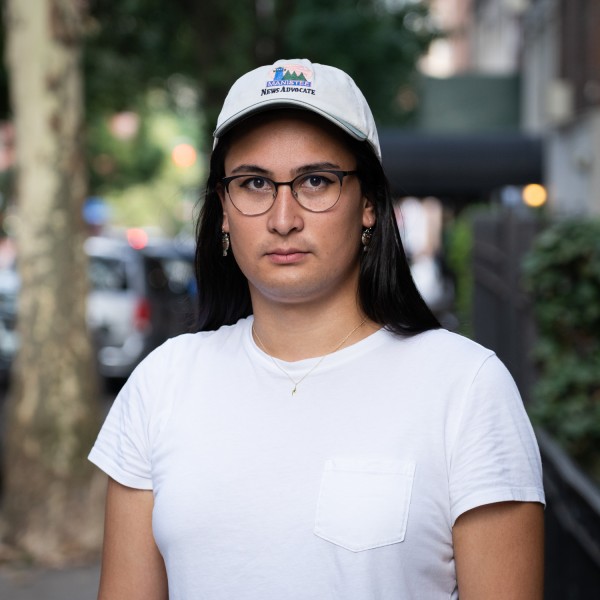Listen To This: Sidney Gish ponders what could’ve been in ‘Filming School’
Read about this week’s most notable singles from Lovejoy, Lana Del Rey and more.
(Illustration by Susan Behrends Valenzuela)
February 16, 2023
This week we’re highlighting songs filled with pain. Singles from Sidney Gish, Lovejoy, Lana Del Rey and NYU’s own Kirsten Johanna examine emotions ranging from self-doubt to abject bitterness. If you’re feeling lonely after Valentine’s Day, read on for songs that are excruciatingly soothing.
“I’m Not Projecting, Angie” by Kirsten Johanna
Sandy Battulga, Music Editor
Kirsten Johanna, a student at NYU’s Clive Davis Institute, is definitely not projecting in this song.
Seemingly giving advice to a friend named Angie who has been hurt by a boy, Johanna consoles her with the jadedness of someone who refuses to admit that they’re afraid of being in love again. With a delicately raspy voice and tremoring vibrato that resembles Fiona Apple’s, she sings, “Oh Angie, don’t you know / That he was never gonna call.” A jaunty ’80s synth takes a prominent position in the instrumentation of “I’m Not Projecting, Angie,” giving the song a nostalgic edge.
In the chorus, Johanna advises their friend, “Everybody knows that if you never stop moving you’ll never start loving / It’s the easiest to do and I’m trying to get you on it I swear I’m being honest.” In the bridge of the song, however, it becomes evident that Johanna is really trying to convince themself of this more than Angie: “There’s no way that I’m projecting cuz I’ve been feeling nothing since I started practicing this plan / I’m not really that lonely and there’s nobody I’m losing I’m about 80% sure that I don’t need anybody.”
A song that is both dance-worthy and cry-worthy, “I’m Not Projecting, Angie” is multifaceted in how addictive it is.
“Filming School” by Sidney Gish
Alex Tey, Editor-at-Large
After several years of releasing the occasional cover and teasing unreleased songs at shows, Sidney Gish returns to the indie pop scene with “Filming School,” her first original release since 2017’s “No Dogs Allowed.” Movie-induced melancholy opened Mitski’s own hiatus-ending single in October 2021, but “Filming School”— which Gish first recorded around that same time — charts another path for musicians who sometimes wish they had gone into film.
“I start lots of songs, but finish very few,” Gish, who did not attend film school, said in a press release publicizing the single. “Sometimes, I try to overcome this habit by skipping the ‘ideas’ phase, and improvising a song to completion within a few hours.”
This spontaneity suits her. Gish is at her best when she’s carefree, unbound by self-consciousness and self-doubt. And even if you still feel out of place, another recurring theme in the Gish canon, at least you don’t have to be alone in that feeling: “We walked around that blank museum / And cried our tears and held our hands / And we were each other’s best friends.” “Filming School” revives sparks of her signature whimsy in the instrumentation as well, with layers of bouncy guitar loops and a noodly synth countermelody. She wants you to take some of the pressure off yourself, singing “It’s up to who? Up to you / What’s worth watching.” We should all hope she can do the same for herself and get that album out.
“Call Me What You Like” by Lovejoy
Lea Filidore, Staff Writer
Lovejoy, a small English indie-rock band, released a new single titled “Call Me What You Like” on Feb. 10. The band, which was formed a couple years ago and has quickly gained popularity in the indie and alternative scenes, put out the single ahead of their new EP titled “WU&IO.”
In “Call Me What You Like,” lead singer Wilbur Soot laments the confusion of modern relationships, an apt message just in time for Valentine’s Day. The song mixes Gold’s soft voice with frenzied monologuing and a classic rock sound. Gold switches between drawling, melodic verses and a feverish, fast-paced chorus marked with strong drums and an interesting guitar component.
The new single is heavier than previous songs by the group, with a powerful bassline and intense vocals. “Call Me What You Like” certainly adds validity to Lovejoy’s rock status. The interesting dichotomy between the hardcore sound and the anxious, love-sick lyrics makes “Call Me What You Like” a must-listen.
“A&W” by Lana Del Rey
Sandy Battulga, Music Editor
The first part of “A&W” is entitled “American Whore” and it begins with a moody melody played on the piano and acoustic guitar. Del Rey’s lyrics are soaked in her usual satisfyingly nihilistic tone: “If I told you that I was raped, do you really think that anybody would think I didn’t ask for it, didn’t ask for it? / Didn’t testify, already fucked up my story.”
The title of the song refers to the root beer company “A&W,” an allusion that fits in with the rest of Del Rey’s Americana-plastered discography. But it also stands for “American Whore,” which Del Rey calls herself in the chorus of the song: “It’s not about having someone to love me anymore / No, this is the experience of being an American whore.”
Part two of “A&W” — titled “Jimmy” — adopts a grittier tone, with an electronic drum beat and bass, both purposefully over-exerted to produce a clipped sound. It’s EDM-adjacent, invoking images of hot summer nights filled with self-sabotaging debauchery. Del Rey sings with a playful recklessness about a character named Jimmy: “Jimmy, if you leave the house, find me in the club (Hey) / Your mom called, I told her, you’re fucking up big time.”
Contact the music desk at [email protected]





























































































































































